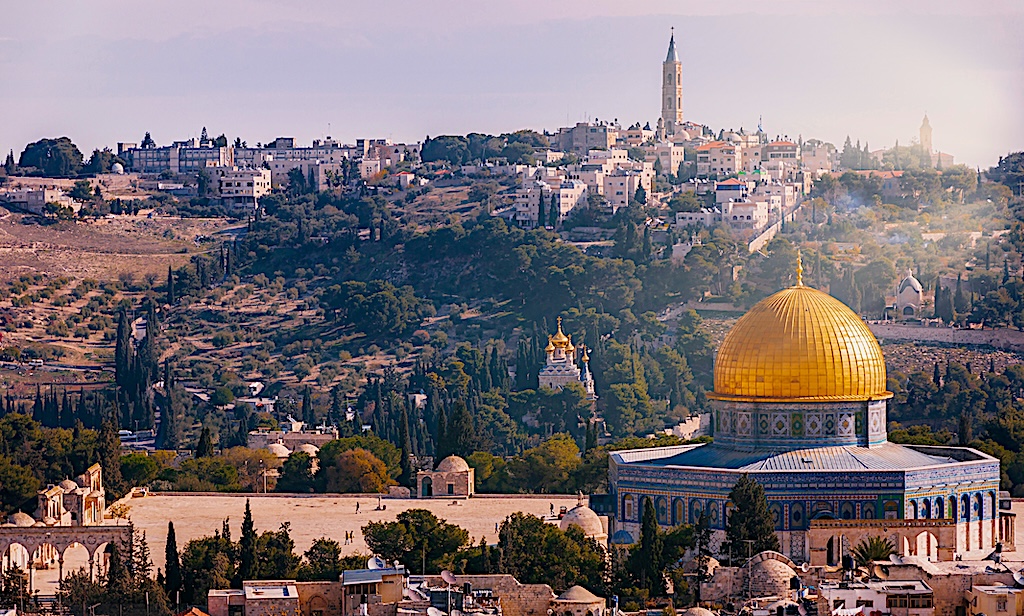Palestine is not just a geographical name or a chapter in a history book; rather, it is a civilizational, cultural, and religious hub with a firm place in the heart of the Middle East, and it is the cradle of the three Abrahamic religions: Islam, Christianity, and Judaism. Its geographical location on the Mediterranean coast, bordering Jordan from the east and Egypt from the southwest, has granted it exceptional strategic importance throughout the ages.
Despite its ancient history, it has been living for more than a century under a complex political and humanitarian conflict, as a result of occupation, colonization, and displacement.
This land has witnessed the passage of various civilizations: from the Canaanites and Phoenicians to the Romans and Byzantines, and then the Islamic conquest in the 7th century, which made it home to religious and historical landmarks such as Al-Aqsa Mosque, the Dome of the Rock, and the Church of the Holy Sepulchre, as well as many monasteries and other sites.
Geographically, the Dead Sea is considered one of the most prominent landmarks of Palestine, as it is the lowest point on Earth and is characterized by its salty waters that allow visitors to float easily. This geographical diversity has contributed to its natural and human uniqueness and deepened its historical and cultural presence.
Politically, Palestine has suffered since the beginning of the 20th century from the consequences of occupation and colonization. Since the Balfour Declaration of 1917, issued by Britain promising the establishment of a national home for Jews in Palestine, large waves of Jewish immigration began, and tensions between Arab and Jewish populations increased, leading to the outbreak of Palestinian revolts, the most notable being the 1936 revolt.
The UN Partition Plan of 1947, which proposed the establishment of two states—one Jewish and one Arab—was rejected by the Arabs. In 1948, Israel declared its state, leading to a war with Arab states that ended with Israel controlling most of the Palestinian lands and displacing more than 700,000 Palestinians in what became known as the Nakba.
The Israeli occupation of the West Bank, Gaza Strip, and East Jerusalem in 1967 further complicated the Palestinian issue. Two popular uprisings (Intifadas) erupted in 1987 and 2000, demanding national rights and rejecting the occupation. Despite the signing of the Oslo Accords in 1993, core issues such as Jerusalem and the refugees remain unresolved to this day.
Despite all challenges, Palestinians have preserved their national and cultural identity, expressing it through arts, literature, and popular resistance, and have maintained their unique heritage in folklore and traditional foods such as Musakhan, Maqluba, and Nabulsi Kanafeh. At present, the Palestinian people face a blockade in Gaza, settlement expansion in the West Bank, and daily violations in Jerusalem. Despite increasing international support for the Palestinian cause, the Palestinian state still faces major obstacles in achieving full independence and international recognition.
Palestine is not merely a political issue, but a humanitarian and historical one, expressing a people’s right to freedom and dignity. Despite the obstacles, the hope of establishing an independent Palestinian state with Jerusalem as its capital remains alive in the hearts of millions around the world. Today, Palestine represents a symbol of steadfastness and determination, and a source of inspiration for nations striving for freedom and justice across the globe.
فِلَسْطِينُ لَيْسَتْ مُجَرَّدَ اِسْمٍ جُغْرَافِيٍّ أَوْ فَصْلٍ فِي كِتَابِ التَّارِيخِ؛ بَلْ هِيَ مَحْوَرٌ حَضَارِيٌّ وَثَقَافِيٌّ وَدِينِيٌّ ذُو مَكَانَةٍ رَاسِخَةٍ فِي قَلْبِ الشَّرْقِ الأَوْسَطِ. وَهِيَ مَهْدٌ لِلدِّيَانَاتِ السَّمَاوِيَّةِ الثَّلَاثِ: الإِسْلَامِ وَالمَسِيحِيَّةِ وَاليَهُودِيَّةِ. مَوْقِعُهَا الجُغْرَافِيُّ عَلَى سَاحِلِ البَحْرِ المُتَوَسِّطِ، مُحَاذِيَةً لِلأُرْدُنِّ مِنَ الشَّرْقِ وَمِصْرَ مِنَ الجَنُوبِ الغَرْبِيِّ، أَكْسَبَهَا أَهَمِّيَّةً اِسْتِرَاتِيجِيَّةً اِسْتِثْنَائِيَّةً عَبْرَ العُصُورِ. وَعَلَى الرَّغْمِ مِنْ تَارِيخِهَا العَرِيقِ، فَإِنَّهَا تَعِيشُ مُنْذُ أَكْثَرَ مِنْ قَرْنٍ فِي ظِلِّ صِرَاعٍ سِيَاسِيٍّ وَإِنْسَانِيٍّ مُعَقَّدٍ، نَتِيجَةَ الِاحْتِلاَلِ وَالِاسْتِعْمَارِ وَالتَّهْجِيرِ.
هَذِهِ الأَرْضُ شَهِدَتْ مُرُورَ حَضَارَاتٍ مُتَنَوِّعَةٍ: مِنَ الكَنْعَانِيِّينَ وَالفِينِيقِيِّينَ إِلَى الرُّومَانِ وَالبِيزَنْطِيِّينَ، ثُمَّ الفَتْحِ الإِسْلَامِيِّ فِي القَرْنِ السَّابِعِ، مَا جَعَلَهَا حَاضِنَةً لِمَعَالِمَ دِينِيَّةٍ وَتَارِيخِيَّةٍ كَالمَسْجِدِ الأَقْصَى، وَقُبَّةِ الصَّخْرَةِ، وَكَنِيسَةِ القِيَامَةِ، فَضْلاً عَنِ العَدِيدِ مِنَ الأَدْيِرَةِ وَالمَعَالِمِ الأُخْرَى.
مِنَ النَّاحِيَةِ الجُغْرَافِيَّةِ، يُعَدُّ البَحْرُ المَيِّتُ أَحَدَ أَبْرَزِ مَعَالِمِ فِلَسْطِين، فَهُوَ أَدْنَى نُقْطَةٍ عَلَى سَطْحِ الأَرْضِ، وَيَمْتَازُ بِمِيَاهِهِ المَالِحَةِ الَّتِي تُتِيحُ لِلزَّائِرِ الطَّفْوَ بِسُهُولَةٍ. هَذَا التَّنَوُّعُ الجُغْرَافِيُّ أَسْهَمَ فِي تَمَيُّزِهَا الطَّبِيعِيِّ وَالإِنْسَانِيِّ، وَعَمَّقَ مِنْ حُضُورِهَا التَّارِيخِيِّ وَالثَّقَافِيِّ.
عَلَى الصَّعِيدِ السِّيَاسِيِّ، عَانَتْ فِلَسْطِينُ مُنْذُ مَطْلَعِ القَرْنِ العِشْرِينَ مِنْ تَدَاعِيَاتِ الاِحْتِلاَلِ وَالاِسْتِعْمَارِ. مُنْذُ وَعْدِ بَلْفُورَ عَامَ ٧١٩١، الَّذِي أَصْدَرَتْهُ بَرِيطَانِيَا مُتَعَهِّدَةً بِإِنْشَاءِ وَطَنٍ قَوْمِيٍّ لِلْيَهُودِ فِي فِلَسْطِين، بَدَأَتْ مَوْجَاتُ هِجْرَةٍ يَهُودِيَّةٍ كَبِيرَةٍ، وَارْتَفَعَتْ حِدَّةُ التَّوَتُّرَاتِ بَيْنَ السُّكَّانِ العَرَبِ وَاليَهُودِ، مَا أَدَّى إِلَى اِندِلَاعِ ثَوْرَاتٍ فِلَسْطِينِيَّةٍ أَبْرَزُهَا ثَوْرَةُ ٦٣٩١.
قَرَارُ التَّقْسِيمِ الصَّادِرُ عَنِ الأُمَمِ المُتَّحِدَةِ عَامَ ٧٤٩١، وَالَّذِي اِقْتَرَحَ إِقَامَةَ دَوْلَتَيْنِ—يَهُودِيَّةٍ وَعَرَبِيَّةٍ—قُوبِلَ بِرَفْضٍ عَرَبِيٍّ. وَفِي عَامَ ٨٤٩١، أَعْلَنَتْ إِسْرَائِيلُ قِيَامَ دَوْلَتِهَا، مَا أَدَّى إِلَى حَرْبٍ مَعَ الدُّوَلِ العَرَبِيَّةِ، وَانْتَهَتْ بِسَيْطَرَةِ إِسْرَائِيلَ عَلَى مُعْظَمِ الأَرَاضِي الفِلَسْطِينِيَّةِ وَتَهْجِيرِ أَكْثَرَ مِنْ ٠٠٧ أَلْفِ فِلَسْطِينِيٍّ فِيمَا عُرِفَ بِالنَّكْبَةِ.
الاِحْتِلاَلُ الإِسْرَائِيلِيُّ لِلضِّفَّةِ الغَرْبِيَّةِ وَقِطَاعِ غَزَّةَ وَالقُدْسِ الشَّرْقِيَّةِ عَامَ ٧٦٩١ زَادَ مِنْ تَعْقِيدِ القَضِيَّةِ الفِلَسْطِينِيَّةِ. اِنْدَلَعَتِ اِنْتِفَاضَتَانِ شَعْبِيَّتَانِ فِي ٧٨٩١ وَ ٠٠٠٢ لِلْمُطَالَبَةِ بِالحُقُوقِ الوَطَنِيَّةِ وَرَفْضِ الاِحْتِلاَلِ. وَرَغْمَ تَوْقِيعِ اِتِّفَاقِ أُوسْلُو عَامَ ٣٩٩١، ظَلَّتِ القَضَايَا الجَوْهَرِيَّةُ—كَالقُدْسِ وَاللَّاجِئِينَ—مُعَلَّقَةً حَتَّى اليَوْمِ.
رَغْمَ كُلِّ التَّحَدِّيَاتِ، حَافَظَ الفِلَسْطِينِيُّونَ عَلَى هُوِيَّتِهِمُ الوَطَنِيَّةَ وَالثَّقَافِيَّةَ، وَعَبَّرُوا عَنْهَا فِي الفُنُونِ وَالأَدَبِ وَالمُقَاوَمَةِ الشَّعْبِيَّةِ، وَاحْتَفَظُوا بِتُرَاثِهِمُ المُميَّزِ فِي الفُلْكْلُورِ وَالمَأكُولاَتِ التَّقْلِيدِيَّةِ كَالمُسَخَّنِ وَالمَقْلُوبَةِ وَالكُنَافَةِ النَّابْلُسِيَّةِ. فِي الوَقْتِ الرَّاهِنِ، يُوَاجِهُ الشَّعْبُ الفِلَسْطِينِيُّ حِصَاراً فِي غَزَّةَ، وَتَوَسُّعاً اِسْتِيطَانِيّاً فِي الضِّفَّةِ الغَرْبِيَّةِ، وَانْتِهَاكَاتٍ يَوْمِيَّةً فِي القُدْسِ. وَرَغْمَ الدَّعْمِ الدَّوْلِيِّ المُتَزَايِدِ لِلْقَضِيَّةِ الفِلَسْطِينِيَّةِ، لا تَزَالُ الدَّوْلَةُ الفِلَسْطِينِيَّةُ تُوَاجِهُ صُعُوبَاتٍ كَبِيرَةً فِي تَحْقِيقِ الاِسْتِقْلاَلِ الكَامِلِ وَالاِعْتِرَافِ الدَّوْلِيِّ.
فِلَسْطِينُ لَيْسَتْ مُجَرَّدَ قَضِيَّةٍ سِيَاسِيَّةٍ، بَلْ هِيَ قَضِيَّةٌ إِنْسَانِيَّةٌ وَتَارِيخِيَّةٌ، تَعْبِّرُ عَنْ حَقِّ شَعْبٍ فِي الحُرِّيَّةِ وَالكَرَامَةِ. وَرَغْمَ العَقَبَاتِ، فَإِنَّ الأَمَلَ فِي إِقَامَةِ دَوْلَةٍ فِلَسْطِينِيَّةٍ مُسْتَقِلَّةٍ، عَاصِمَتُهَا القُدْسُ، لا يَزَالُ حَيًّا فِي قُلُوبِ المَلاَيِينِ حَوْلَ العَالَمِ. تُمَثِّلُ فِلَسْطِينُ اليَوْمَ رَمْزاً لِلصُمُودِ وَالإِصْرَارِ، ونَمُوذَجاً لِنِضَالِ الشُّعُوبِ فِي وَجْهِ الاِحْتِلاَلِ وَمَصْدَرَ إِلْهَامٍ لِلشُّعُوبِ السَّاعِيَةِ إِلَى الحُرِّيَّةِ وَالعَدَالَةِ فِي مُخْتَلَفِ أَنْحَاءِ العَالَمِ.
https://forms.gle/kN8J8C6jgdg3373i9 اختبر نفسك
Test yourself https://forms.gle/8uHYvX9dacFYSrPH7

